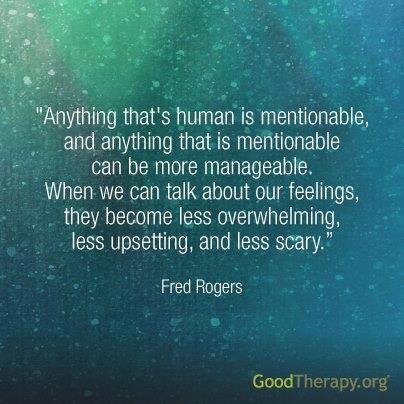I meet with many different families and individuals in my practice. One of the most fascinating things that I hear from almost everyone is something along the lines of “I just want my child to be happy” or “I just want to be happy, like everyone else.” I find this so interesting for two reasons. On one hand, I totally understand that feeling and can relate to just wanting to feel better, happy, successful, etc. On the other hand, while I understand the drive towards happiness, I do not necessarily think that the goal of life or a childhood is happiness. I think that a more realistic and helpful goal is to feel at peace even when facing adversity and to allow ourselves to sit with discomfort long enough to learn the lesson it teaches.
Additionally, I think that our culture’s obsession with being happy has dramatic consequences. One consequence that I see in my work is that people are becoming increasingly uncomfortable and avoidant of any emotion seen as “negative” such as sadness, despair, anger, shame, and guilt. I find it curious that so many emotions get such a bad rap just because they are uncomfortable for us to experience. The interesting thing is that life and growth truly begin at the end of our comfort zone and I think that by avoiding the less pleasant emotions, we restrict our growth and our experience of other emotions as well. I walk with people through change on a daily basis as a therapist and try to push myself towards change and I have to say, it is not always fun, comfortable, or happy. Change is typically painful and can be a struggle, even when we know the end goal will make us feel better in some way or that we are learning something. However, that does not mean that we need to run from change! Change is an exciting, amazing, scary, and beautiful process when we can embrace it. Above all, it is a process and it certainly is not something that happens instantaneously (as much as we may want it to!).
I think that a possible solution is to change our goal away from simply being happy and towards a full experience of the range of emotions life has to offer and towards resiliency in the face of challenging situations, feelings, and environments. While some feelings are uncomfortable to experience, we need to embrace them and accept their presence in our lives. I often talk with my clients about how emotions are cues to our environment and they are important sources of information about our lives. When we constantly avoid or numb them, we do not learn the lesson or understand what they are trying to show us or teach us. While I am not advocating wallowing in our emotions or “feeding” them with negative self-talk, I think we need to learn to recognize them and become curious about them. Once we can accept that the full range of feelings is meaningful in our lives, maybe we can invite them in for a bit to learn from them, experience them, and then let them go. One way to do this is to cultivate mindfulness of our thoughts and feelings through treating our emotions and thoughts as a wave that comes and goes. Early in my training, I learned to be curious about my thoughts rather than blindly accepting them as facts and it helps to remember that thoughts are just thoughts and feelings are just feelings.
Another area that I think is very impacted by our culture’s “happiness” obsession is parenting. I think that parents have become so concerned with providing their children with opportunities to feel happy that they sometimes miss providing them opportunities to learn to cope with disappointment, failure, and difficult situations that will inevitably come up in life. I often work with parents who struggle to set limits with their children and I think this has something to do with all of our difficulties tolerating unpleasant emotions. We want to rescue our loved ones from feeling things we do not want to feel so we may unconsciously do things to protect them from adversity and end up doing a complete disservice to them. While I obviously do not want children to feel miserable all the time, I think that helping them learn how to handle challenges in life is crucial in building resiliency. Resiliency is one of the most important tools a child can have and will serve them well in life. I think that we can give children different messages about failure, challenges, and fairness that will prepare them better for the world. I think these messages need to honor the fact that challenges are okay, feelings are all okay and not “good” or “bad,” and that sometimes we just need to accept things as they are. We need to be role models for them and truly become more comfortable with pain, failure, mistakes, and uncomfortable feelings in order to teach children that they are not to be feared. If we fear challenge, failure, uncomfortable feelings, so will our children. All of us need to accept that everyone faces adversity and it is how you respond that matters most.
Have questions about our practice? Please contact us regarding any issues around child, our teen psychotherapists, adult or marriage and family therapy services San Diego by Thrive Therapy Studio.
Reach out to start
your healing journey


